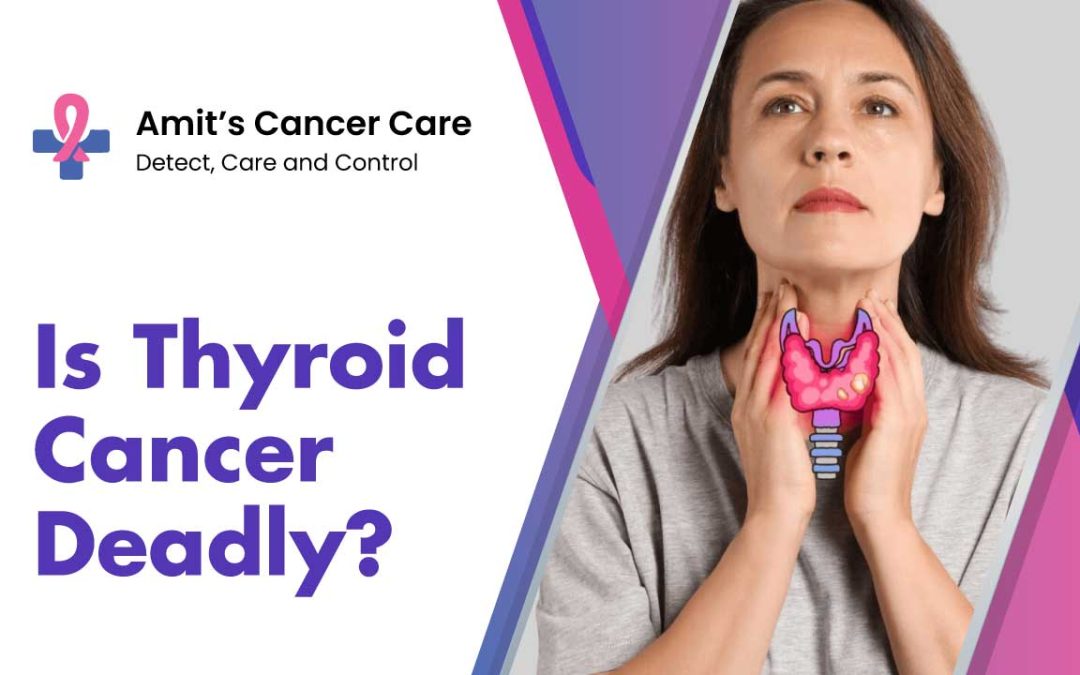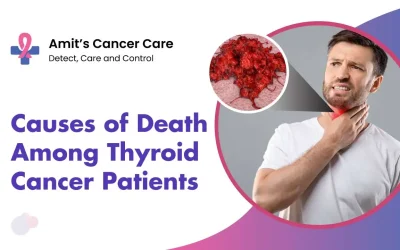Is Thyroid Cancer Deadly?
Receiving a diagnosis of thyroid cancer can be a distressing experience, raising concerns about the potential severity of the disease. This comprehensive article aims to clarify the risks and outcomes associated with thyroid cancer.
By delving into the various factors that influence its prognosis, exploring treatment options, and discussing the impact of early detection and prevention, we aim to empower individuals in India with knowledge and understanding.

What is Thyroid Cancer?
Thyroid cancer is a type of cancer that originates in the thyroid gland, a small butterfly-shaped gland located at the base of the neck. This gland plays a crucial role in regulating metabolism and producing essential hormones for the body’s functioning.
When abnormal cell growth occurs in the thyroid gland, it can lead to the development of thyroid cancer.
There are different types of thyroid cancer, including papillary carcinoma, follicular carcinoma, medullary carcinoma, and anaplastic carcinoma.
The most common type is papillary carcinoma, accounting for about 80% of all thyroid cancer cases. Each type has its characteristics and may require different treatment approaches.
Prevalence and Risk Factors
Thyroid cancer is one of the most common cancers worldwide, and its incidence is increasing globally, including in India. While it can affect people of all ages, it is more commonly diagnosed in individuals between 30 and 60.
Several risk factors increase the likelihood of developing thyroid cancer. These include a family history of thyroid cancer, exposure to high levels of radiation, specific genetic syndromes such as familial medullary thyroid cancer (FMTC), multiple endocrine neoplasia (MEN), and iodine deficiency or excess.
It is important to note that having one or more risk factors does not guarantee the development of thyroid cancer but increases the individual’s susceptibility to the disease.
Diagnosing Thyroid Cancer
Detecting thyroid cancer at an early stage is crucial for successful treatment. However, the early stages of thyroid cancer often do not present noticeable symptoms.
As the cancer progresses, individuals may experience symptoms such as a lump or nodule in the neck, difficulty swallowing, hoarseness, or voice changes.
If an oncologist suspects thyroid cancer based on symptoms or other factors, they will perform various diagnostic tests to confirm the diagnosis.
These tests may include a physical examination, ultrasound, fine-needle aspiration biopsy, blood tests to measure thyroid hormone levels, and imaging tests such as computed tomography (CT) scans or magnetic resonance imaging (MRI).
Stages and Prognosis
Thyroid cancer is staged based on the size of the tumor, its spread within the thyroid gland, and whether it has spread to nearby lymph nodes or other parts of the body. The staging helps determine the severity of the cancer and guides treatment decisions.
The prognosis for thyroid cancer is generally favorable, with a high survival rate. The five-year survival rate for thyroid cancer is over 98% for localized cases.
However, it is essential to note that prognosis can vary depending on the type and stage of thyroid cancer and individual factors such as age and overall health.
Must Watch This Video
Treatment Options
The treatment approach for thyroid cancer depends on various factors, including the type, stage, and characteristics of the cancer, as well as the individual’s overall health and preferences.
The main treatment options for thyroid cancer include surgery, radioactive iodine therapy, external beam radiation therapy, targeted therapy, and hormone replacement therapy.
Surgery is the primary treatment for most cases of thyroid cancer. It involves removing all or part of the thyroid gland and sometimes nearby lymph nodes.
In some cases, radioactive iodine therapy may be recommended after surgery to destroy any remaining thyroid tissue or cancer cells.
External beam radiation therapy and targeted therapy may be used in more advanced cases or if the cancer has spread to other body parts.
Living with Thyroid Cancer
A diagnosis of thyroid cancer can have a significant emotional impact on individuals and their loved ones. Coping with the physical, emotional, and practical aspects of living with thyroid cancer is essential for overall well-being.
It is common for individuals with thyroid cancer to experience a range of emotions, including fear, anxiety, sadness, or anger. Seeking support from oncologists, support groups, or counseling services can help individuals navigate these emotions and develop coping strategies.
Additionally, maintaining a healthy lifestyle, managing the side effects of treatment, and staying connected with loved ones can contribute to a better quality of life during and after treatment.
Prevention and Early Detection
While it may not be possible to prevent all cases of thyroid cancer, specific measures can help reduce the risk. Maintaining a healthy lifestyle that includes a balanced diet, regular exercise, and avoiding exposure to radiation and environmental toxins can contribute to overall well-being and potentially reduce the risk of developing thyroid cancer.
Additionally, ensuring adequate iodine intake through diet or supplementation is essential as both deficiency and excess of iodine can increase the risk of thyroid disorders, including cancer.
Early detection plays a crucial role in improving the prognosis of thyroid cancer. Regular self-examinations of the neck can help individuals identify any unusual lumps or changes in the thyroid gland. If any abnormalities are detected, it is essential to consult a thyroid cancer Doctor in Mumbai for a thorough evaluation.
An oncologist may perform diagnostic tests such as ultrasound, fine-needle aspiration biopsy, and blood tests to assess the health of the thyroid and detect any potential abnormalities. These tests can provide valuable information about the presence of cancer cells and guide further treatment decisions.
Conclusion
while receiving a diagnosis of thyroid cancer can be overwhelming, it is essential to remember that thyroid cancer is often treatable, and the prognosis is generally favorable, especially with early detection and appropriate treatment.
Understanding the risks and outcomes associated with thyroid cancer is essential for individuals in India and worldwide.
Individuals can take an active role in their thyroid health by being aware of the prevalence, risk factors, signs and symptoms, diagnostic tests, treatment options, and prevention strategies.
Regular check-ups, self-examinations, and open communication with thyroid cancer surgeons in Mumbai are essential to early detection and effective management of thyroid cancer.

-
About Author
Dr. Amit Chakraborty
Cancer Surgeon
Dr. Amit Chakraborty is a Surgical Oncologist in Girgaon, Mumbai and has an experience of 15 years in this field. He is a well known cancer specialist with an expertise in diagnosing and treating head and neck cancer.








